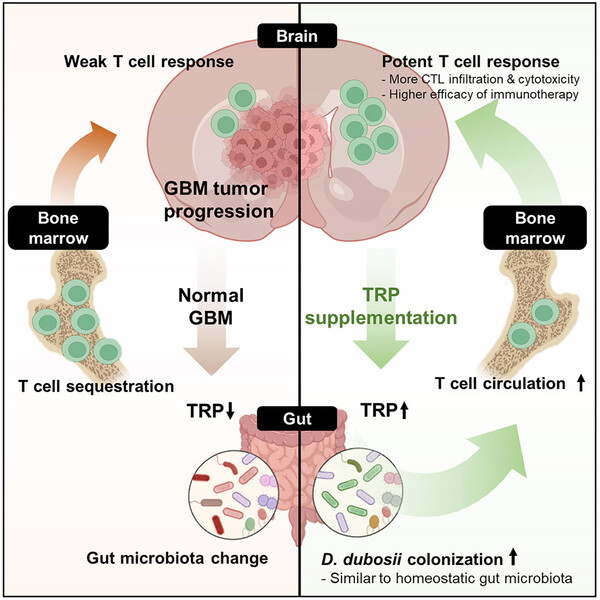Korean researchers have proposed a new treatment strategy for glioblastoma, an incurable brain tumor that does not respond to immunotherapies. They have demonstrated, "for the first time worldwide," that gut microbes and their metabolites can enhance immunotherapy responses.
The Korea Advanced Institute of Science and Technology (KAIST) announced on Tuesday that a research team led by Professor Lee Heung-kyu from the Department of Life Sciences has identified and demonstrated a method to enhance the efficacy of glioblastoma immunotherapy by targeting changes in the gut microbiome.

The team noted that as glioblastoma progresses, the concentration of the amino acid tryptophan in the gut decreases significantly, which alters the gut microbiome. When tryptophan was supplemented to restore microbial diversity, certain beneficial strains activated CD8 T cells, a type of immune cell, and drew them back into the tumor tissue.
In a mouse glioblastoma model, the team found that supplementing with tryptophan enhanced the CD8 T-cell response to attack the cancer. These T-cells migrated more to tumor sites, including lymph nodes and the brain.
The researchers also found that the beneficial gut bacterium Duncaniella dubosii played a key role in this process. Duncaniella dubosii helps T cells redistribute effectively in the body, the team explained. When combined with an immuno-oncology drug (anti-PD-1), survival rates also improved.
In germ-free mice lacking gut microbiota, the presence of Duncanella dubosii alone increased glioblastoma survival. This confirms that the strain uses tryptophan to regulate the gut environment, and that the substances it produces enhance the ability of CD8 T cells to attack cancer.
“This study is significant because it shows that even in refractory brain tumors, where immune checkpoint inhibitors have been ineffective, a combination strategy using gut microbes can significantly increase treatment response,” Professor Lee said.
The study, in which Dr. Kim Hyeon-cheol at KAIST participated as first author, was published on June 26 in the international journal Cell Reports under the title “Gut microbiota dysbiosis induced by brain tumor modulates the efficacy of immunotherapy.”

